2014年3月高级口译真题:听力部分上半场(原文+解析)
2014届高三3月联考英语试题(解析版)
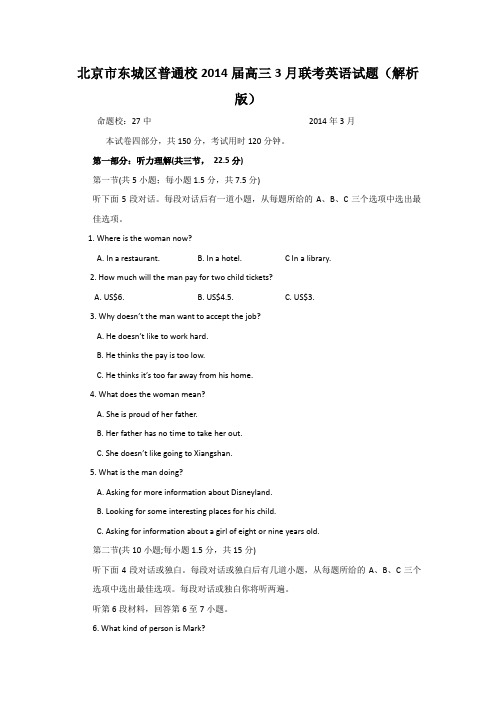
北京市东城区普通校2014届高三3月联考英语试题(解析版)命题校:27中2014年3月本试卷四部分,共150分,考试用时120分钟。
第一部分:听力理解(共三节,22.5分)第一节(共5小题;每小题1.5分,共7.5分)听下面5段对话。
每段对话后有一道小题,从每题所给的A、B、C三个选项中选出最佳选项。
1. Where is the woman now?A. In a restaurant.B. In a hotel. C In a library.2. How much will the man pay for two child tickets?A. US$6.B. US$4.5.C. US$3.3. Why doesn’t the man want to accept the job?A. He doesn’t like to work hard.B. He thinks the pay is too low.C. He thinks it’s too far away from his home.4. What does the woman mean?A. She is proud of her father.B. Her father has no time to take her out.C. She doesn’t like going to Xiangshan.5. What is the man doing?A. Asking for more information about Disneyland.B. Looking for some interesting places for his child.C. Asking for information about a girl of eight or nine years old.第二节(共10小题;每小题1.5分,共15分)听下面4段对话或独白。
14年高考英语听说考试真题C录音原文与参考答案
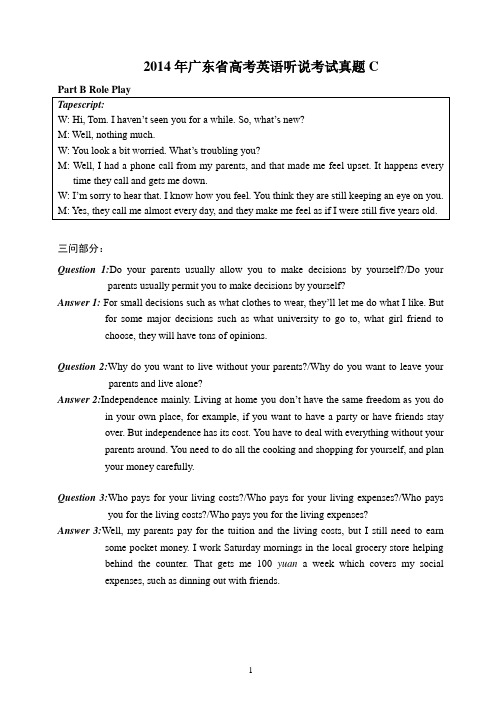
2014年广东省高考英语听说考试真题C三问部分:Question 1:Do your parents usually allow you to make decisions by yourself?/Do your parents usually permit you to make decisions by yourself?Answer 1: For small decisions such as what clothes to wear, they’ll let me do what I like. But for some major decisions such as what university to go to, what girl friend tochoose, they will have tons of opinions.Question 2:Why do you want to live without your parents?/Why do you want to leave your parents and live alone?Answer 2:Independence mainly. Living at home you do n’t have the same freedom as you do in your own place, for example, if you want to have a party or have friends stayover. But independence has its cost. You have to deal with everything without yourparents around. You need to do all the cooking and shopping for yourself, and planyour money carefully.Question 3:Who pays for your living costs?/Who pays for your living expenses?/Who pays you for the living costs?/Who pays you for the living expenses?Answer 3:Well, my parents pay for the tuition and the living costs, but I still need to earn some pocket money. I work Saturday mornings in the local grocery store helpingbehind the counter. That gets me 100 yuan a week which covers my socialexpenses, such as dinning out with friends.五答部分:Question 1:What made Tom feel upset?Answer 1:A phone call from his parents./His parents’ phone call.Question 2:How often do Tom’s parents call him?Answer 2:Almost every day.Question3:Who will probably decide Tom’s choice of university?Answer 3: His parents.Question 4:Where can young people have the freedom to have a party?Answer 4:In their own places./In his own place.Question 5:How does Tom get his pocket money?Answer 5:He works Saturday mornings in the local grocery store./By helping behind the counter in the local grocery store.参考复述:Mary wanted to buy a birthday present for her husband Tom, but she wanted to surprise him. So instead of asking him dire ctly, she asked Tom’s sister to phone him and ask him whathe wanted for his birthday. Then, she could listen to the conversation from the next room. While they were talking, she heard Tom say he wanted a pair of sneakers. Soon after, Mary went to a shop a nd bought a pair of nice new sneakers for him. When Tom’s birthday arrived, Mary gave him the present. Tom opened the package, and looked at the shoes, but he didn’t seem very excited. Mary asked him what was wrong. She said she thought he had wanted a pai r of sneakers. Tom laughed. He said that actually, he’d wanted a pair of speakers.。
历年高口NTGF原文真题
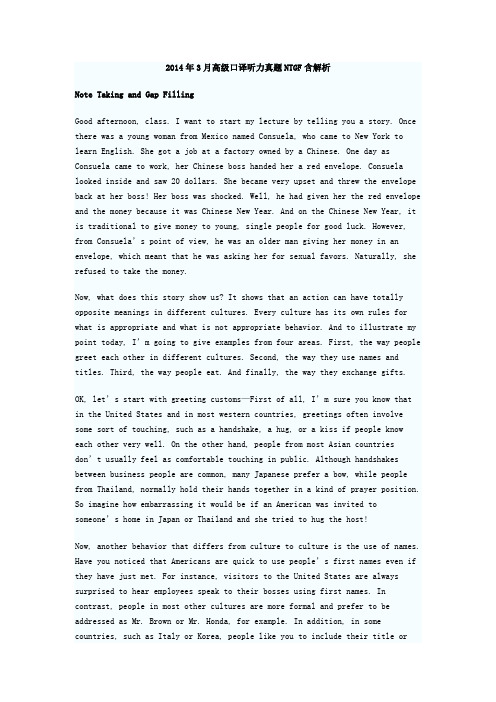
2014年3月高级口译听力真题NTGF含解析Note Taking and Gap FillingGood afternoon, class. I want to start my lecture by telling you a story. Once there was a young woman from Mexico named Consuela, who came to New York to learn English. She got a job at a factory owned by a Chinese. One day as Consuela came to work, her Chinese boss handed her a red envelope. Consuela looked inside and saw 20 dollars. She became very upset and threw the envelope back at her boss! Her boss was shocked. Well, he had given her the red envelope and the money because it was Chinese New Year. And on the Chinese New Year, it is traditional to give money to young, single people for good luck. However, from Consuela’s point of view, he was an older man giving her money in an envelope, which meant that he was asking her for sexual favors. Naturally, she refused to take the money.Now, what does this story show us? It shows that an action can have totally opposite meanings in different cultures. Every culture has its own rules for what is appropriate and what is not appropriate behavior. And to illustrate my point today, I’m going to give examples from four areas. First, the way people greet each other in different cultures. Second, the way they use names and titles. Third, the way people eat. And finally, the way they exchange gifts.OK, let’s start with greeting customs—First of all, I’m sure you know that in the United States and in most western countries, greetings often involve some sort of touching, such as a handshake, a hug, or a kiss if people know each other very well. On the other hand, people from most Asian countriesdon’t usually feel as comfortable touching in public. Although handshakes between business people are common, many Japanese prefer a bow, while people from Thailand, normally hold their hands together in a kind of prayer position. So imagine how embarrassing it would be if an American was invited to someone’s home in Japan or Thailand and she tried to hug the host!Now, another behavior that differs from culture to culture is the use of names. Have you noticed that Americans ar e quick to use people’s first names even if they have just met. For instance, visitors to the United States are always surprised to hear employees speak to their bosses using first names. In contrast, people in most other cultures are more formal and prefer to be addressed as Mr. Brown or Mr. Honda, for example. In addition, in some countries, such as Italy or Korea, people like you to include their title orposition with their family names, especially if they’re university graduates or owners of a business.Now I want to look at eating customs. I’ll talk about the behaviors connected with eating that vary from culture to culture. One of these is the use of utensils. You probably know that people in many Asian cultures use chopsticks but in some countries i t’s customary to eat with your fingers. It’s important to be aware of different dining customs. Here is another example. In some cultures, eating everything on your plate is considered impolite. In Egypt and China, you should leave some food in your dish at the end of the meal. This is to show that your hosts were generous and gave you more than enough to eat. However, Americans generally consider a clean plate as a sign of satisfaction with the food.Finally, what I want to mention today is gift giving, which you may think is a universal custom and there is not much variation from culture to culture. But the rules of gift giving can be very complicated. In USA, if you’re invited to someone’s home for dinner, bring wine or flowers or small item as a present. On the other hand, the Japanese give gifts quite frequently, often to thank someone, such as a teacher or a doctor. In the Japanese culture, gift giving is a very ancient tradition and it has many detailed rules. Another interesting fact about gift giving is that many cultures have strict rules about gifts you should not give. For example, never give yellow flowers to people from Iran, which means you hate them!【评析】本文题材对考生来说并不陌生,是老生常谈的文化差异。
2014年catti三级综合能力口译试题(三)
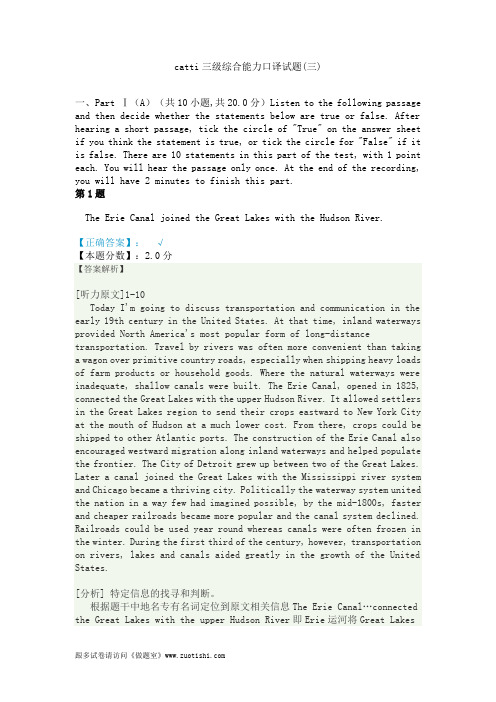
catti三级综合能力口译试题(三)一、Part Ⅰ(A)(共10小题,共20.0分)Listen to the following passage and then decide whether the statements below are true or false. After hearing a short passage, tick the circle of "True" on the answer sheet if you think the statement is true, or tick the circle for "False" if it is false. There are 10 statements in this part of the test, with 1 point each. You will hear the passage only once. At the end of the recording, you will have 2 minutes to finish this part.第1题The Erie Canal joined the Great Lakes with the Hudson River.【正确答案】:√【本题分数】:2.0分【答案解析】[听力原文]1-10Today I'm going to discuss transportation and communication in the early 19th century in the United States. At that time, inland waterways provided North America's most popular form of long-distance transportation. Travel by rivers was often more convenient than taking a wagon over primitive country roads, especially when shipping heavy loads of farm products or household goods. Where the natural waterways were inadequate, shallow canals were built. The Erie Canal, opened in 1825, connected the Great Lakes with the upper Hudson River. It allowed settlers in the Great Lakes region to send their crops eastward to New York City at the mouth of Hudson at a much lower cost. From there, crops could be shipped to other Atlantic ports. The construction of the Erie Canal also encouraged westward migration along inland waterways and helped populate the frontier. The City of Detroit grew up between two of the Great Lakes. Later a canal joined the Great Lakes with the Mississippi river system and Chicago became a thriving city. Politically the waterway system united the nation in a way few had imagined possible, by the mid-1800s, faster and cheaper railroads became more popular and the canal system declined. Railroads could be used year round whereas canals were often frozen in the winter. During the first third of the century, however, transportation on rivers, lakes and canals aided greatly in the growth of the United States.[分析] 特定信息的找寻和判断。
14年高考英语听说考试真题F录音原文与参考答案

2014年广东省高考英语听说考试真题F三问部分:Question 1:What do your parents like about China?/What do your parents love about China?/What are your parents fond of about China?Answer 1: Well, they like music and operas. My mother told me that she was amazed at Beijing Opera, the singing and the dancing impressed her so much. She said shewould like to visit Beijing just for the opera. And my father likes whatever mymother likes.Question 2:Why don’t you buy some Beijing Opera DVDs as gifts?/Why don’t you buy some Beijing Opera DVDs as presents?/Why not purchase some Beijing Opera DVDsas presents?/Why not purchase some Beijing Opera DVDs as gifts?Answer 2:Hey, that’s a good idea. DVDs are easy to carry and they save space. My parents may watch Beijing Opera together at home.Question 3:What gifts do you plan to buy for your brother and sister?/What presents do you plan to buy for your brother and sister?/What presents do you plan to purchase foryour brother and sister?/What gifts do you plan to purchase for your brother andsister?/What gifts do you decide to buy for your brother and sister?/What presentsdo you decide to buy for your brother and sister?/What gifts do you decide topurchase for your brother and sister?/What presents do you decide to purchase foryour brother and sister?Answer 3:That’s tough. My sister is just twelve years old. She likes running. I think I can get her a flying kite, yes, a lovely and fancy flying kite for the little girl. What aboutthe 18-year-old boy? Hmm…he is learning Chinese now and he hopes to visitChina soon. So maybe I can get him a T-shirt printed with some Chinesecharacters. That’ll make a good gift.五答部分:Question 1:How long has Tom been in China?Answer 1:For fourteen months.Question 2:Why was he deep in thought?Answer 2:He thinks about how happy he’ll be to see his family and what kinds of gifts he should bring back from China for everyone./He thinks about how happy he’ll be tosee his family and what gifts he should buy for them.Question3:What might be the reason for Tom’s mother to visit China?Answer 3: She likes Beijing Opera.Question 4:What are the advantages of DVDs as gifts?Answer 4:They are easy to carry and they save space.Question 5:What gift will Tom buy for his sister?Answer 5:A lovely and fancy flying kite./A flying kite.参考复述:Tom is very forgetful and careless with his money. He often forgets his money at school, or finds that his dog has eaten some of his cash. One day, his mother was washing some of Tom’s clothes. She usually checks his trouser pockets before putting them in the washingmachine, but this time she forgot. Tom was reading in another room, when suddenly he remembered he’d had a ten-pound note in his trouser pockets. He quickly ran to his mother and asked her if she’d put his trousers in the machine. She said she had put them in about twenty minutes before. Tom went to the machine and took his trousers out. He finally found the ten-pound note in the pocket of his trousers, but it had lost its color and looked like a piece of white paper. Tom was very disappointed.。
2014年全国高考英语听力卷试题、答案 听力原文
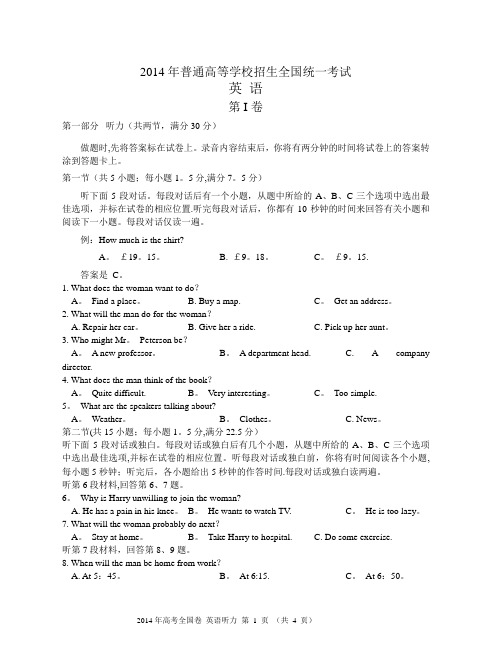
2014年普通高等学校招生全国统一考试英语第I卷第一部分听力(共两节,满分30分)做题时,先将答案标在试卷上。
录音内容结束后,你将有两分钟的时间将试卷上的答案转涂到答题卡上。
第一节(共5小题;每小题1。
5分,满分7。
5分)听下面5段对话。
每段对话后有一个小题,从题中所给的A、B、C三个选项中选出最佳选项,并标在试卷的相应位置.听完每段对话后,你都有10秒钟的时间来回答有关小题和阅读下一小题。
每段对话仅读一遍。
例:How much is the shirt?A。
£19。
15。
B. £9。
18。
C。
£9。
15.答案是C。
1. What does the woman want to do?A。
Find a place。
B. Buy a map. C。
Get an address。
2. What will the man do for the woman?A. Repair her car。
B. Give her a ride.C. Pick up her aunt。
3. Who might Mr。
Peterson be?A。
A new professor。
B。
A department head. C. A company director.4. What does the man think of the book?A。
Quite difficult. B。
Very interesting。
C。
Too simple.5。
What are the speakers talking about?A。
Weather。
B。
Clothes。
C. News。
第二节(共15小题;每小题1。
5分,满分22.5分)听下面5段对话或独白。
每段对话或独白后有几个小题,从题中所给的A、B、C三个选项中选出最佳选项,并标在试卷的相应位置。
听每段对话或独白前,你将有时间阅读各个小题,每小题5秒钟;听完后,各小题给出5秒钟的作答时间.每段对话或独白读两遍。
上海中级口译听力真题2014年3月
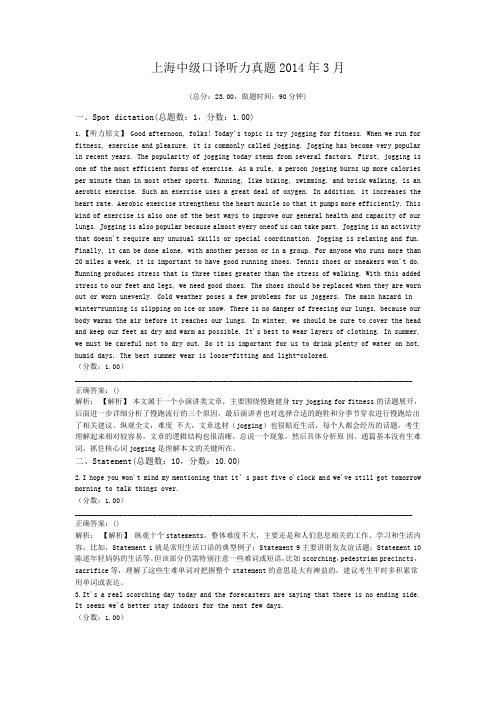
上海中级口译听力真题2014年3月(总分:23.00,做题时间:90分钟)一、Spot dictation(总题数:1,分数:1.00)1.【听力原文】 Good afternoon, folks! Today's topic is try jogging for fitness. When we run for fitness, exercise and pleasure, it is commonly called jogging. Jogging has become very popular in recent years. The popularity of jogging today stems from several factors. First, jogging is one of the most efficient forms of exercise. As a rule, a person jogging burns up more calories per minute than in most other sports. Running, like biking, swimming, and brisk walking, is an aerobic exercise. Such an exercise uses a great deal of oxygen. In addition, it increases the heart rate. Aerobic exercise strengthens the heart muscle so that it pumps more efficiently. This kind of exercise is also one of the best ways to improve our general health and capacity of our lungs. Jogging is also popular because almost every oneof us can take part. Jogging is an activity that doesn't require any unusual skills or special coordination. Jogging is relaxing and fun. Finally, it can be done alone, with another person or in a group. For anyone who runs more than 20 miles a week, it is important to have good running shoes. Tennis shoes or sneakers won't do. Running produces stress that is three times greater than the stress of walking. With this added stress to our feet and legs, we need good shoes. The shoes should be replaced when they are worn out or worn unevenly. Cold weather poses a few problems for us joggers. The main hazard in winter-running is slipping on ice or snow. There is no danger of freezing our lungs, because our body warms the air before it reaches our lungs. In winter, we should be sure to cover the head and keep our feet as dry and warm as possible. It's best to wear layers of clothing. In summer, we must be careful not to dry out. So it is important for us to drink plenty of water on hot, humid days. The best summer wear is loose-fitting and light-colored.(分数:1.00)__________________________________________________________________________________________ 正确答案:()解析:【解析】本文属于一个小演讲类文章,主要围绕慢跑健身try jogging for fitness的话题展开,后面进一步详细分析了慢跑流行的三个原因,最后演讲者也对选择合适的跑鞋和分季节穿衣进行慢跑给出了相关建议。
2014级高三三诊英语参考答案及评分标准

英语 三诊 参考答案第1㊀页(共2页)成都市2014级高中毕业班第三次诊断性检测英语参考答案及评分标准第Ⅰ卷(100分)第一部分㊀听力(满分30分)1-5A B B A C 6-10A C B A C 11-15C A A B C16-20C B C A B 评分标准:1~20题,每小题1.5分.第二部分㊀第一节㊀阅读理解(满分30分)21-25B D A D C 26-30B A C B A 31-35C B C D A 评分标准:21~35题,每小题2分.第二节(满分10分)36-40G B C F E 评分标准:36~40小题,每小题2分.第三部分㊀第一节㊀完形填空(满分30分)41-45B D C A D 46-50C A B D A 51-55D C B C A 56-60A A B D B 评分标准:41~60小题,每小题1.5分.第Ⅱ卷(50分)第二节(满分15分)61.h o p e f u l l y ㊀62.w h a t ㊀㊀㊀㊀㊀63.pe r s o n a l ㊀㊀64.a n ㊀㊀㊀65.i n t e n t i o n 66.a m u s i n g 67.a c t i v i t i e s 68.t o t h i n k 69.b ef o r e 70.b e d i s a p p o i n t e d 评分标准:61-70小题,每小题1.5分.有任何错误,包括用词错误㊁单词拼写错误(含大小写)或语法形式错误,均不给分.第四部分㊀第一节㊀短文改错(满分10分)M a n yp e o p l em a y h a v e h e a r d ɡa ㊀o f /a b o u t p l a n t t h a tw e c a l l i t \t o r t o i s e Gs h e l l b a m b o o n a t i v e t o C h i n a .T h i sb a m b o oc a n g r o ws o a s t a l l a s28m e t r e s .T h i s p a r t i c u l a rs p e c i e sa r e i s t h e m o s t c o mm o n l y u s e dm a t e r i a l i nC h i n a sb a m b o o i n d u s t r y .B e f o r e A f t e r i t i s p l a n t e d ,n oo b v i o u s l y o b v i o u s g r o w t ho c c u r s f o r u p t o f i v e y e a r s -e v e nu n d e r i d e a l c o n d i t i o n s !T h e n ,a s i f b y m a g i c ,a t h e p l a n t s u d d e n l y b e g i n s t o g r o wa t t h e r a t e o f n e a r l y 70c e n t i m e t r e s p e r d a y ,r e a c h e d r e a c h i n g i t s f u l l h e i g h tw i t h i n s i xw e e k s .B e s i d e s H o w e v e r ,i t sn o tm a g i c .T h eb a m b o o s r a p i d g r o w t hr e s u l t e d r e s u l t s f r o mt h e m i l e so fr o o t si td e v e l o p sd u r i n g t h o s ef i r s tf i v e y e a r s ,f i v e y e a r so f g e t t i n g r e a d y .评分标准:有任何错误,包括用词错误㊁单词拼写错误(含大小写)或语法形式错误,均不给分.第二节㊀书面表达(满分25分)一㊁各档次语言要点配分参考标准档次要点数要点分语言要点表达情况划档依据第五档521~25语言基本无误,行文连贯,表达清楚第四档416~20语言有少量错误,行文基本连贯,表达基本清楚第三档311~15语言有一些错误,尚能表达第二档26~10语言错误很多,影响表达第一档10~5只能写出与要求内容有关的一些单词二㊁内容要点认定及计分参考标准1.活动时间及地点(说明清楚㊁表达正确,计6分,其中时间3分,地点3分);2.活动内容(说明清楚㊁表达正确,计11分);3.活动意义(说明清楚㊁表达正确,计8分).三㊁扣分参考依据1㊁其表达未能达成正确句意的,不给分,如:写出了主语或谓语等关键词,但未能达成符合要点要求㊁意义正确的句子;2㊁句子结构完整,但关键点出现错误或漏掉部分关键词,扣半个要点分.如:主谓一致错误,或关键词拼写错误(如主语㊁关键性名词等),或谓语动词时态/语态错误等;3㊁凡使用铅笔答题,或答题中使用了涂改液或不干胶条,一律不给分;4㊁凡多次出现非关键性单词拼写错误或其它同类错误,原则上每4处扣1分;5㊁文章内容要点全面,但写出了一些多余内容(连接或过渡词句不在此列),原则上不扣分;6㊁凡书写超出规定的答题区域,全卷不给分;7㊁书写潦草凌乱,但基本不影响阅卷的,酌情扣卷面分1~2分.四㊁O n e p o s s i b l e v e r s i o nA M e a n i n g f u l S o c i a lA c t i v i t yL a s t S a t u r d a y,o u r c l a s sh e l da m e a n i n g f u l a c t i v i t y s h o w i n g o u rs i n c e r ec o n c e r nf o r t h e e l d e r l y i n t h en u r s i n g h o m e.T h em o m e n tw ew e n t t h e r e,a l l o f u s g o t s t a r t e d i mm e d i a t e l y.S o m e o f u s c l e a n e d t h e r o o m s a n dw i n d o w s c a r e f u l l y,s o m e c h a t t e dw i t ht h e e l d e r l y d e l i g h t f u l l y,a n ds o m ee v e n s a n g b e a u t i f u ls o n g s.T h i s w o n d e r f u la n d h a p p p y m o m e n tl a s t e df o r m o r et h a nf o u r h o u r s.A t l a s t,w e l e f tw i t h f u l l e n j o y m e n t a n d p r i d e,p r o m i s i n g m o r e r e g u l a r v i s i t s.C a r i n g f o ro t h e r si sat r a d i t i o n a lv i r t u e o fo u r n a t i o n.I fe v e r y o n el o v e s o t h e r s u n c o n d i t i o n a l l y,w e c a n s u r e l y m a k e o u r c o u n t r y ab e t t e r p l a c e t o l i v e.(101w o r d s)英语 三诊 参考答案第2㊀页(共2页)。
(完整)14年高考英语听说考试真题A录音原文与参考答案

2014年广东省高考英语听说考试真题AOne of the most extraordinary civilizations the world has known disappeared. Millions of people die, some were savagely murdered. Why it happened is a mystery. This is the story of one man's search for the truth. The Maya lived in what is today Southern Mexico and central America.They were deeply spiritual, worshipping dozens of gods of the sun and moon, the earth and wind, fire and, rain.From the jungles and plains rose cities and towns, great centers of worship, of art and learning.The Maya’s achievements were staggering, they developed their own writing, and mastered astronomy and mathematics.三问部分:Question 1:颜色怎样影响我们的购买行为?How do colors affect our buying decisions?How do colors influence our buying decisions?How do colors influence our purchasing behavior? How do colors affect our buying behavior?How do colors influence our buying behavior?How do colors affect our purchasing behavior? Answer 1: People have different feelings about colors and their feelings help them decide what tobuy. For example, blue makes people feelpeaceful, quiet.It doesn’t create strongemotions. So it’s a favorit e for banks andinsurance companies. And for sellingproducts, it’s often used to suggestsomething pure and fresh.Question 2: 什么颜色对顾客更有吸引力?What color is more attractive to customers?/What color can attract customers more?/What color can appeal to more customers?/What color can attract people’s attention more?/What color can draw people’s attention more?Answer 2:Well, you can sell almost anything with a red.It’s a hot color, which suggests a feeling ofenergy and even excitement, it catches yourattention. You often see red on magazinecovers. But if you use it too much, it lookscheap and may make people tired. Question 3:绿色是广告流行的颜色吗?Is green a popular color in advertising?/Is green a fashionable color in advertising?Answer 3:Surprisingly, green isn’t used much in advertising except for garden products.Although it’s friendly and cool, it can alsobe quite strong and many people associate itwith unpleasant ideas.五答部分:Question 1:How did Dr. Brown do his research? Answer 1:By doing surveys and interviews.Question 2:How much time did Dr. Brown spend on his book?Answer 2:Thirteen months.Question3:What does blue suggest in advertising? Answer 3: Something pure and fresh.Question 4:Why can’t we use red too much in advertising?Answer 4:It looks cheap and may make people tired. Question 5:What color is suitable for garden products? Answer 5:Green.参考复述:One morning, Tom was on the school bus with other kids.But then the bus driver, who was feeling unwell, suddenly passed out.It happened very quickly, and the bus began to runoff the road.All the kids screamed except Tom, because he knew a lot about cars and often helped his father repair his car.So Tom ran to the front of the bus, and pushed the bus driver to one side.He stepped on the brakes and stopped the bus.Nobody was hurt, and the story of Tom saving the kids on the bus became well known.He even appeared on television, and his school gave him an award.Tom’s father was proud of him, and said he’d teach Tom to drive when Tom was old enough.。
2014年3月公共英语三级真题及答案解析
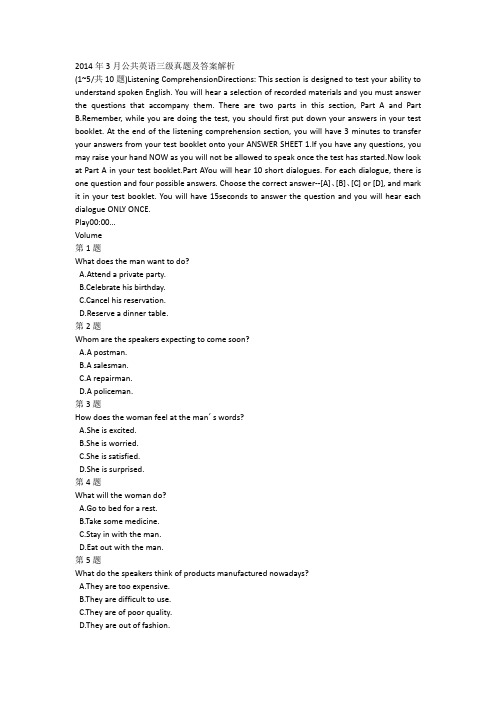
2014年3月公共英语三级真题及答案解析(1~5/共10题)Listening ComprehensionDirections: This section is designed to test your ability to understand spoken English. You will hear a selection of recorded materials and you must answer the questions that accompany them. There are two parts in this section, Part A and Part B.Remember, while you are doing the test, you should first put down your answers in your test booklet. At the end of the listening comprehension section, you will have 3 minutes to transfer your answers from your test booklet onto your ANSWER SHEET 1.If you have any questions, you may raise your hand NOW as you will not be allowed to speak once the test has started.Now look at Part A in your test booklet.Part AYou will hear 10 short dialogues. For each dialogue, there is one question and four possible answers. Choose the correct answer--[A]、[B]、[C] or [D], and mark it in your test booklet. You will have 15seconds to answer the question and you will hear each dialogue ONLY ONCE.Play00:00…Volume第1题What does the man want to do?A.Attend a private party.B.Celebrate his birthday.C.Cancel his reservation.D.Reserve a dinner table.第2题Whom are the speakers expecting to come soon?A.A postman.B.A salesman.C.A repairman.D.A policeman.第3题How does the woman feel at the man´ s words?A.She is excited.B.She is worried.C.She is satisfied.D.She is surprised.第4题What will the woman do?A.Go to bed for a rest.B.Take some medicine.C.Stay in with the man.D.Eat out with the man.第5题What do the speakers think of products manufactured nowadays?A.They are too expensive.B.They are difficult to use.C.They are of poor quality.D.They are out of fashion.下一题(6~10/共10题)Listening ComprehensionDirections: This section is designed to test your ability to understand spoken English. You will hear a selection of recorded materials and you must answer the questions that accompany them. There are two parts in this section, Part A and Part B.Remember, while you are doing the test, you should first put down your answers in your test booklet. At the end of the listening comprehension section, you will have 3 minutes to transfer your answers from your test booklet onto your ANSWER SHEET 1.If you have any questions, you may raise your hand NOW as you will not be allowed to speak once the test has started.Now look at Part A in your test booklet.Part AYou will hear 10 short dialogues. For each dialogue, there is one question and four possible answers. Choose the correct answer--[A]、[B]、[C] or [D], and mark it in your test booklet. You will have 15seconds to answer the question and you will hear each dialogue ONLY ONCE.Play00:00…Volume第6题What do we learn about the man from the dialogue?A.He doesn´ t need a car.B.He´ s just got a good deal.C.He´ s just bought a new car.D.He doesn´ t have enough money.第7题What does the man think of Frank?A.He is dependable.B.He is weak-minded.C.He is a tough person.D.He is a flexible person.第8题What is the woman doing according to the dialogue?A.Arranging a seaside trip for old people.B.Expressing her thanks to the trip organizer.plaining about yesterday´ s seaside trip.D.Asking the trip organizer to improve his work.第9题What do we learn about the man last night?A.He couldn´ t get out of his room.B.He left his key with his roommate.C.He couldn´t find the key to his room.D.He helped his neighbor break the lock.第10题What does the woman suggest the man do?A.Clean his glasses after painting.B.Take off his glasses before painting.C.Press the plastic wrap on the ceiling.D.Cover his glasses with the plastic wrap.上一题下一题(11~13/共15题)You are going to hear four conversations. Before listening to each conversation, you will have 5 seconds to read each of the questions which accompany it. After listening, you will have time to answer each question by choosing [A]、[B]、[C] or [D]. You will hear each passage or conversation ONLY ONCE. Mark your answers in your test booklet.Play00:00…Volume第11题Where did the man get the money for his company?A.From a bank.B.From his father.C.From his friends.D.From his employees.第12题What mistake does the man say his company made?A.It charged no licensing fee.B.It neglected product design.C.It ignored negotiating skills.D.It did all the manufacturing itself.第13题What does the man think of large companies?A.They are tough to work with.B.They welcome creative ideas.C.They recycle lots of garbage.D.They are good at manufacturing.上一题下一题(14~17/共15题)You are going to hear four conversations. Before listening to each conversation, you will have 5 seconds to read each of the questions which accompany it. After listening, you will have time to answer each question by choosing [A]、[B]、[C] or [D]. You will hear each passage or conversation ONLY ONCE. Mark your answers in your test booklet.Play00:00…Volume第14题What was the man´ s major as an undergraduate?A.English.B.Physics.C.Fashion design.D.International trade.第15题What does the man think of his job in Magna Design?A.Interesting.B.Impressive.C.Demanding.petitive.第16题What does the man expect from a new job?A.A quicker promotion.B.Greater success.C.More responsibilities.D.More challenges.第17题What job is the man applying for?A.Art designer.B.Assistant manager.C.German translator.D.Marketing director.上一题下一题(18~21/共15题)You are going to hear four conversations. Before listening to each conversation, you will have 5 seconds to read each of the questions which accompany it. After listening, you will have time to answer each question by choosing [A]、[B]、[C] or [D]. You will hear each passage or conversation ONLY ONCE. Mark your answers in your test booklet.Play00:00…Volume第18题What did Edward want the man to do?A.To lend him his class notes.B.To help him go over the last class.C.To ask leave for him next Monday.D.To copy the class handouts for him.第19题Why is the man so upset?A.He has trouble with his chemistry.B.He has trouble with his classmates.C.He had to miss his chemistry class.D.He had to reject his friend´ s request.第20题Why was Edward absent from his chemistry class?A.He went to a concert.B.He went to see a friend.C.He went to see a doctor.D.He went to a funny show.第21题What do we learn about the man?A.He´ s a man of humor.B.He´ s a man of ambition.C.He´ s a man of principle.D.He´ s a man of sympathy.上一题下一题(22~25/共15题)You are going to hear four conversations. Before listening to each conversation, you will have 5 seconds to read each of the questions which accompany it. After listening, you will have time to answer each question by choosing [A]、[B]、[C] or [D]. You will hear each passage or conversation ONLY ONCE. Mark your answers in your test booklet.Play00:00…Volume第22题What does Smith say about coffee?A.It should be sold in cans.B.It should be drunk slowly.C.It should be long stored for better taste.D.It should be enjoyed together with wine.第23题What is the price of a coffee vacation per person in Italy?A.$100B.$1,800C.1895D.1988第24题How many days does the tour in Peru last?A.2B.7C.9D.12第25题What can vacationers do in Hawaii?A.Go on a coffee-farm driving tour.B.Visit female-owned coffee farms.C.See several different coffee houses.D.Explore the living history of coffee.上一题下一题(26~45/共20题)Directions:Read the following text from which 10 words have been removed. Choose from the words A~O the most suitable one to fill each numbered gap in the text (46-55). There are FIVE extra words that you do not need to use.In the United States today, families basically have two contrasting attitudes toward television. Many families__26__the television to be on at any time of the day or night. Very often, __27__of these families watch television__28__or don´ t interact with other family members__29__they are watching. The TV is used to make__30__kind of background noise in the house, __31__as a kind of electronic babysitter. Parents often turn it on to__32__"bored" children. In contrast, other families__33__control when the television will be watched and what programs can be watched. __34__these families watch programs together and discuss them together. In these homes, the TV is rarely on__35__nobody is watching it. Parents don´t use it as an electronic babysitter; __36__, they insist that children read or play __37__rather than sit in front of a screen.__38__the contrasting attitudes toward television__39__, families in America are choosing television__40__other passive activities, such as watching movies, playing video games, and surfing the Web__41__regularity that has never happened before. These activities are__42__in their inactivity. Family members—young and old—watch rather than __43__. These passive forms of entertainment__44__, rather than encourage, family __45__and community involvement.第26题A.allowB.enableC.causeD.require第27题A.parentsB.membersC.seniorsD.children第28题A.singlyB.looselyC.flexiblyD.directly第29题A.whichB.whileC.whereasD.wherever第30题A.littleB.suchC.someD.this第31题A.orB.andC.thusD.so第32题A.enlightenB.entertainC.moveD.manage第33题A.effectivelyB.strictlyC.unwillinglyD.widely第34题A.NeverB.HardlyC.SeldomD.Often第35题A.ifB.even ifC.soD.so that第36题A.howeverB.insteadC.moreoverD.therefore第37题A.separatelyB.quietlyC.creativelyD.actively第38题A.Because ofB.In place ofC.In spite ofD.Speaking of 第39题A.viewingcatingC.broadcastingD.programming 第40题A.amongB.despiteC.andD.as第41题A.withB.byC.forD.over第42题ualC.sameD.similar第43题A.sleepB.sitC.eatD.do第44题A.weakenB.endC.avoidD.worry第45题A.buildingB.interactionC.planningD.reunion上一题下一题(46~50/共15题)ComprehensionDirections:Read the following two texts. Answer the questions on each text by choosing A, B, C or D. Nisaburo and Hiroko Ohata are unlike most Japanese couples their age. Sure, Hiroko, 58, is worried about her husband´ s high blood pressure, while Nisaburo, 60, promises his wife that if she loses 18 pounds they´ 11 take a trip abroad. What makes the Ohatas different is how they met, through a matchmaking organization for single seniors. "On the second date, he asked if I wanted to meet his family," says Hiroko. "I took that as a proposal. " A little rushed, perhaps, but 17 years after his wife´s death, Nisaburo knew he´d found a new wife. The couple just celebrated four years of marital happiness last month.In the past, people like Nisaburo and Hiroko might have chosen to live out their lives alone. But as Japan´ s society ages, attitudes about love and remarriage late in life are changing. In 2006, according to government data, three times more men and nearly five times more women in their 60s and 70s married for at least the second time, compared with 20 years before.Granted, change is slow. For this silver-haired population, the concept of "dating" is still masked by the term ocha nomi tomodachi(friends having tea together). And older people often need help meeting prospective mates. That´ s where specialized matchmaking services such as Ai Senior—"Love Senior" —come in. When Shunichi Ikeda started the online service three years ago, he was surprised by how many visits he was getting from people in their 60s.Ikeda says that his clients have an "American perspective" about the dating scene. And their children are often very supportive, sometimes being the ones to register parents. "More older people are realizing that life is supposed to be enjoyable—not lonely," says Ikeda. About 17% of the matchmaking clients in Japan are over 50 years old, according to Ai Senior, and seniors´market share has more than doubled over the past three years." For older, single men, even doing laundry or cooking is difficult," says Ikeda. " They want to live with a woman. Likewise, it can be boring for women living alone. They want to provide for第46题According to the writer, the Ohatas are different from most senior Japanese couples in thatA.they remarried with the help of an agencyB.they decided to marry on the second dateC.the husband suffers from a health problemD.the wife is concerned about losing weight第47题As is implied in the text, Nisaburo´ s proposal on the second date might be consideredA.typical of single seniorsB.irresponsible to his familyC.a surprise to the womanD.a decision made in haste第48题In Japan, the change in attitudes about remarriage results from an increase in______.A.its populationB.single womenC.senior peopleD.the divorced第49题According to Ai Senior, the matchmaking clients in Japan______.A.admire the American lifestyleB.are mostly under 50 years of ageC.share a vague term for "dating"D.doubled over the past three years第50题According to Ikeda, more single seniors remarry in order to______.A.live a longer lifeB.solve financial problemsC.make their life enjoyableD.support their children together上一题下一题(51~55/共15题)ComprehensionDirections:Read the following two texts. Answer the questions on each text by choosing A, B, C or D. When you become a parent, much of your focus shifts from your own future to your kids´ future. But one of the most effective ways to help your children learn to dream big is to ensure that your own dreams don´t get pushed aside by everyday demands.Our everyday experiences provide learning opportunities. When you tap into them, you create a lifelong learning habit that will always keep you growing. Even your most disappointing experiences can be turned into breakthroughs.Every dream begins in the imagination. Take a few minutes to sit down with a notebook and think about where you would like to be in 20 years. Write down details about all aspects of your ideal life. Feel free to imagine. Don´t worry about whether you know how to get there now—you have 20 years to figure that out. You can also start by picking a year in the future and making acollection of things you´ d like in your life by then. Check in on it from time to time to see where you´ ve made progress.We´ re often encouraged to work on our weaknesses, but working on your strengths is easier and creates better results. For help of identifying them, ask some friends, or colleagues to write down what they most appreciate about you. They´ll enjoy doing this, and you´ 11 feel great when you read the responses. Once you know your strengths, you can put them to work to help you achieve your dreams.Confidence is the foundation for all your other abilities. "Progress, not perfection" is a great saying to keep your confidence high. Every night, write down five achievements that happened that day. Big or small, it doesn´ t matter. If proper, add ideas for further progress arid actions you can take to get started.Find ways to add what you love to do to your life now. This will give you more energy and keep you connected with your bigger dreams. Making a list of old hobbies is a great way to restore your old passions. Things you´re enthusiastic about come with their own store of energy. Connecting with them can give you a push when you most need it.第51题In order to help your children to dream big you must______.A.fulfill everyday tasksB.build your own careerC.keep your own dreamsD.make them look ahead第52题The writer suggests that, to begin your big dream, you should______.A.stretch your imaginationB.have a best-laid plan for 20 yearsC.recollect all your likes and dislikesD.engage yourself in lifelong learning第53题According to the writer, to achieve our dreams, we should______.A.work on our strengthsB.develop our creativityC.identify our weaknessesD.seek advice from friends第54题To keep high confidence, it is important for one to .A.take appropriate actionsB.notice his daily progressC.try his best in everythingD.form new ideas every day第55题The writer thinks that one can hold fast to his dream by .A.listing the details of his ideal lifeB.improving some of his old hobbiesC.adding new ideas to his old dreamsD.energizing himself with old passions上一题下一题(56~60/共15题)ComprehensionDirections:Read the following two texts. Answer the questions on each text by choosing A, B, C or D. Commercial classical music radio in North America has changed dramatically over the past decade. The number of stations has shrunk very rapidly—many operators dropped the format in favor of something more profitable, like pop or rock, with their crazy youthful audience. But the availability of satellite radio, Internet streaming and digital technologies has introduced new options for classical fans.In the city of Toronto, a familiar media player entered the tray last year: Moses Znaimer, 65, the famous brave television pioneer who was the driving force behind Toronto´ s CITY-TV. Eleven months ago, he took ownership of Classical 96.3 FM, Canada´s first and largest commercial classical station, which " re-launched" this month with some new on-air hosts, a totally new schedule, and more attention to singing art and less to full-length symphonies.The popular station airs selections(usually no more than 10 to 15 minutes long)of greatest-hits classical works, 24 hours a day. This usually means single movements of larger works and other pieces, with commercial ads in between. The station may never be the preferred destination of highbrow classical fans, who seek full-length symphonies and operas. But this doesn´ t seem to trouble Znaimer, who says of his main competitor, CBC Radio Two: "They play classical, and they do it well when they do it, but they don´ t do it all the time, and they´ re doing it less and less. "Marilyn Gilbert, a Toronto artist manager, also makes a comparison to Canada´s national broadcaster when she praises Znaimer´s station: "Classical 96.3 FM is very important for the community and the country, especially in view of the changes that are going on at CBC. "Znaimer is best-known for his influential work in television, but he was also one of the creators of Cross Country Checkup, the longest-running show on CBC Radio. Today he calls Classical 96.3 FM "arguably the most successful of all classical music stations on the continent. At about 800,000 listeners per week, we are larger even than the New York Times classical station[WQXR-FM]. " And under his excellent and creative leadership, the sound of the station has become livelier.第56题Many operators have dropped commercial classical radio in order to______.A.make more profitsB.promote pop musice new technologyD.attract classical fans第57题From the text we learn that Moses Znaimer wanted to______.A.consolidate his position at Classical 96. 3 FMB.acquaint classical fans with some new radio stationsC.help expand Toronto´ s CITY-TV into a bigger businessD.make Classical 96.3 FM more satisfying to classical fans第58题It can be inferred that Classical 96. 3 FM makes money by _A.attracting and broadcasting commercialsB.showing carefully selected programspeting with CBC Radio TwoD.pleasing highbrow classical fans第59题Marilyn Gilbert believes Classical 96. 3 FM______.A.encourages people to learn classical musicB.introduces a new idea to broadcasting reformC.matters a lot to the community and the countryD.causes CBC to change its way of program arrangement第60题The success of Classical 96. 3 FM lies in the fact that_____A.it has reformed its traditional program styleB.it is more diverse than WQXR-FM in New YorkC.it has attracted audiences of different age groupsD.it is the biggest broadcasting station on the continent上一题下一题(61~65/共5题)ComprehensionDirections:Read the texts from a magazine article in which five people talk about tipping in a restaurant. For questions 36-40, match the name of each person to one of the statements (A-G) given below. Laura:I think that I have to agree with you. The idea to surround yourself with good and successful people still rings true. The electronic age may aid contact and communication. However, it does not substitute for looking someone in the eye. One has to have that person-to-person feel to instinctively grasp inner character. I´ m sure that a combination of the two types of interaction will lend flavor to the future.Mike:I naturally tend to prefer face-to-face relationship building. However, having friends and business acquaintances all over the world, I find that tools such as Linkedln are quite useful. Both enable me to maintain old connections and make new connections with people I find I have something in common with. Learning how to use these vehicles is the key. I think we are presently in the process of doing just that.Nick:Just like what you have already mentioned, there is obviously a big difference between how people meet and interact on the net and in real world. What the network world offers is a more relaxed, fun, expressive place to be. I like social networking particularly because it offers me a chance to make a lot of friends. That social networking sites do not build long-lasting relationships is just a misconception.Linda:It is all about a combination of various networking sites, and, if you want to do business, just a few e-mail exchanges. That´ s how I get to know my clients. Face-to-face networking is not always possible for me. I have clients around the globe ,99% of whom I´ ve never met in person. People who oppose social-networking sites don´ t understand the real changes that have taken place in the last decade.Helen:Sure enough, social networks are used to reconnect with friends. But they are also a tool for getting your business recognized. They are great places to place ads or comments about your business, because they are open to the public to view. It can be used as a way to network with would-be consumers. It is a perfect way to promote your business to the widest range of people globally.Now match the name of each person(61 to 65)to the appropriate statement.Note: there are two extra statements.Statements[A]I do not think that online friendships are short-lived.[B]Networking can make your companies better known.[C]I doubt if people could use networking vehicles properly.[D]To benefit from networking, you should learn how to use it.[E]To understand people better, you have to meet them in person.[F]Social networking reflects the new demands of the changing time.[G]In my opinion, networking has more disadvantages than advantages.第61题Laura _______第62题Mike ________第63题Nick _________第64题Linda ________第65题Helen ________上一题下一题(1/1)WritingDirections:You should write your responses to both Part A and Part B of this section on your ANSWER SHEET.Part A第66题You want to invite John Smith, your former English teacher, to attend a reunion party of your class.Write an email to him,1)telling him the purpose of the party, time and place of the party, etc. ;2)expressing your wish for his accepting the invitation.You should write approximately 100 words. Do not use your own name at the end of your email. Use "Wang Lin" instead. _______________上一题下一题(1/1)WritingDirections:Read the text below. Write an essay in about 120 words, in which you should summarize the key points of the text and make comments on them. Try to use your own words.第67题Below is a chart showing the number of students wearing glasses within a class of 50 students ina junior high school. Look at the chart and write an essay of about 120 words making reference to the following points;1)tendency of short-sightedness among the students;2)possible reasons and solutions to the problem.图片___________上一题交卷交卷答题卡答案及解析(1~5/共10题)Listening ComprehensionDirections: This section is designed to test your ability to understand spoken English. You will hear a selection of recorded materials and you must answer the questions that accompany them. There are two parts in this section, Part A and Part B.Remember, while you are doing the test, you should first put down your answers in your test booklet. At the end of the listening comprehension section, you will have 3 minutes to transfer your answers from your test booklet onto your ANSWER SHEET 1.If you have any questions, you may raise your hand NOW as you will not be allowed to speak once the test has started.Now look at Part A in your test booklet.Part AYou will hear 10 short dialogues. For each dialogue, there is one question and four possible answers. Choose the correct answer--[A]、[B]、[C] or [D], and mark it in your test booklet. You will have 15seconds to answer the question and you will hear each dialogue ONLY ONCE.Play00:00…Volume第1题What does the man want to do?A.Attend a private party.B.Celebrate his birthday.C.Cancel his reservation.D.Reserve a dinner table.参考答案: D 您的答案:未作答答案解析:[听力原文]M: Hello .I´d like to book a table for Tuesday evening.W: I´m sorry. We are fully reserved for that evening. There´s the birthday party. Would you consider another day?M: In that case, let´ s make it Wednesday evening at six.W: OK.第2题Whom are the speakers expecting to come soon?A.A postman.B.A salesman.C.A repairman.D.A policeman.参考答案: C 您的答案:未作答答案解析:[听力原文]M: Shoot, no wonder it´s no cooler than outside. You turned the air-condition off.W: Oh, something went wrong with it. But I called someone and they are on the way.M: Thank God.W: You can use the electric fan here. At least you can catch a breeze.第3题How does the woman feel at the man´ s words?A.She is excited.B.She is worried.C.She is satisfied.D.She is surprised.参考答案: D 您的答案:未作答答案解析:[听力原文]M: Shoot, no wonder it´s no cooler than outside. You turned the air-condition off.W: Oh, something went wrong with it. But I called someone and they are on the way.M: Thank God.W: You can use the electric fan here. At least you can catch a breeze.第4题What will the woman do?A.Go to bed for a rest.B.Take some medicine.C.Stay in with the man.D.Eat out with the man.参考答案: A 您的答案:未作答答案解析:[听力原文]M: Are you coming to the restaurant with us, Judy?W: I´ m sorry I can´t. I´ ve got a splitting headache.M: Oh, is there anything that I can do?W: No. It´ s OK. I´ ve taken the medicine, and I´ll just stay in and lie down.第5题What do the speakers think of products manufactured nowadays?A.They are too expensive.B.They are difficult to use.C.They are of poor quality.D.They are out of fashion.参考答案: C 您的答案:未作答答案解析:[听力原文]M: I still remember those good old days when people took pride in their work and built things to the last.W: Absolutely. Look at the things built nowadays.M: You´ re lucky if they don´ t fall apart before you get them home.下一题(6~10/共10题)Listening ComprehensionDirections: This section is designed to test your ability to understand spoken English. You will hear a selection of recorded materials and you must answer the questions that accompany them. There are two parts in this section, Part A and Part B.Remember, while you are doing the test, you should first put down your answers in your test booklet. At the end of the listening comprehension section, you will have 3 minutes to transfer your answers from your test booklet onto your ANSWER SHEET 1.If you have any questions, you may raise your hand NOW as you will not be allowed to speak once the test has started.Now look。
2014年3月全国英语等级考试二级听力真题(含录音原文及答案)
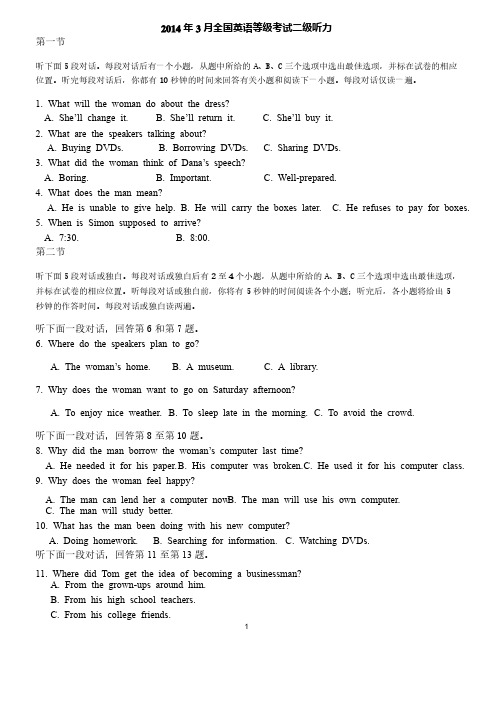
1 2014年3月全国英语等级考试二级听力第一节听下面5段对话。
每段对话后有一个小题,从题中所给的A 、B 、C 三个选项中选出最佳选项,并标在试卷的相应位置。
听完每段对话后,你都有10秒钟的时间来回答有关小题和阅读下一小题。
每段对话仅读一遍。
1. What will the woman do about the dress? A. She’ll change it. B. She’ll return it. C. She’ll buy it. 2. What are the speakers talking about? A. Buying DVDs. B. Borrowing DVDs. C. Sharing DVDs. 3. What did the woman think of Dana’s speech?A. Boring. B. Important. C. Well-prepared. 4. What does the man mean? A. He is unable to give help. A. He is unable to give help. B. He will carry the boxes later. B. He will carry the boxes later. C. He refuses to pay for boxes. 5. When is Simon supposed to arrive? A. 7:30. B. 8:00. 第二节听下面5段对话或独白。
每段对话或独白后有2至4个小题,从题中所给的A 、B 、C 三个选项中选出最佳选项,并标在试卷的相应位置。
听每段对话或独白前,你将有5秒钟的时间阅读各个小题;听完后,各小题将给出5秒钟的作答时间。
每段对话或独白读两遍。
听下面一段对话,回答第6和第7题。
6. Where do the speakers plan to go? A. The woman’s home. B. A museum. C. A library. 7. Why does the woman want to go on Saturday afternoon? A. To enjoy nice weather. B. To sleep late in the morning. B. To sleep late in the morning. C. To avoid the crowd. C. To avoid the crowd. 听下面一段对话,回答第8至第10题。
2014年3月高考英语听力原文及答案

2014年3月二级高考英语听力试题Text 1W: Oh, what a pretty dress! My daughter would love it. But it seems a bit too large. Do you have a smaller size? M: Sorry. This is the only one left. But don’t worry. Children grow fast!W: Yes, that’s true. I’ll take it.1. What will the woman do about the dress? CC. She’ll buy it.Text 2W: These DVDs will be due back on Thursday the 7th.M: How much more should we pay to keep them another week?2. What are the speakers talking about? BB. Borrowing DVDs.Text 3M: What did you think of Dana’s speech today?W: Well, she must have spent a lot of time preparing it. I ca n’t believe I could sit for that long without feeling bored.3. What did the woman think of Dana’s speech? CC. Well-prepared.Text 4W: Could you help us carry these boxes, sir?M: Oh, I’d like to help you, but I’ve got a pain in my back.4. What does the man mean? AA. He is unable to give help.Text 5W: I wonder if Simon will be here by 8. He’s supposed to be.M: His wife said he left at 7:30, so he should be here by 8:10 at the latest.5. When is Simon supposed to arrive? BB. 8:00.Text 6M: Are you free on the weekend?W: I haven’t got any plans yet. Why?M: There’s an exhibition of Chinese paintings at the public library. W ould you like to go with me?W: I’d love to. But when?M: How about Saturday morning? It’s cooler in the morning, and may be less crowded.1W: I’m afraid I cannot get up early on weekends. I prefer Saturday afternoon. Believe me, there won’t be too many people.M: So, shall we meet at 2 Saturday afternoon?W: Ok, that would be great. I’ll be waiting for you at my home.听下面一段对话,回答第6和第7题。
2014年3月公共英语三级考试真题及答案
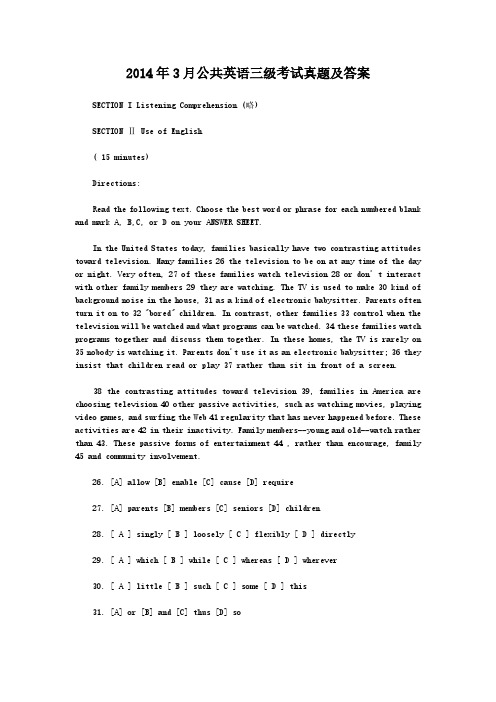
2014年3月公共英语三级考试真题及答案 SECTION I Listening Comprehension (略) SECTION Ⅱ Use of English ( 15 minutes) Directions: Read the following text. Choose the best word or phrase for each numbered blank and mark A, B,C, or D on your ANSWER SHEET. In the United States today, families basically have two contrasting attitudes toward television. Many families 26 the television to be on at any time of the day or night. Very often, 27 of these families watch television 28 or don' t interact with other family members 29 they are watching. The TV is used to make 30 kind of background noise in the house, 31 as a kind of electronic babysitter. Parents often turn it on to 32 "bored" children. In contrast, other families 33 control when the television will be watched and what programs can be watched. 34 these families watch programs together and discuss them together. In these homes, the TV is rarely on 35 nobody is watching it. Parents don't use it as an electronic babysitter; 36 they insist that children read or play 37 rather than sit in front of a screen. 38 the contrasting attitudes toward television 39, families in America are choosing television 40 other passive activities, such as watching movies, playing video games, and surfing the Web 41 regularity that has never happened before. These activities are 42 in their inactivity. Family members--young and old--watch rather than 43. These passive forms of entertainment 44 , rather than encourage, family 45 and community involvement. 26. [A] allow [B] enable [C] cause [D] require 27. [A] parents [B] members [C] seniors [D] children 28. [ A ] singly [ B ] loosely [ C ] flexibly [ D ] directly 29. [ A ] which [ B ] while [ C ] whereas [ D ] wherever 30. [ A ] little [ B ] such [ C ] some [ D ] this 31. [A] or [B] and [C] thus [D] so 32. [ A ] enlighten [ B ] entertain [ C ] move [ D ] manage [ D ] manage 33. [ A ] effectively [ B ] strictly [ C ] unwillingly [ D ] widely 34. [ A ] Never [ B ] Hardly [ C ] Seldom [ D ] Often 35. [A] if [B] even if [C] so [D] so that 36. [ A ] however [ B ] instead [ C ] moreover [ D ] therefore 37. [A] separately [B] quietly [C] creatively [D] actively 38. [ A ] Because of [ B ] In place of [ C ] In spite of [ D ] Speaking of 39. [A] viewing [R] educating [C] broadcasting [D] programming 40. [ A ] among [ B ] despite [ C ] and [ D ] as 41. [A] with [B] by [C] for [D] over 42. [ A ] usual [ B ] common [ C ] same [ D ] similar 43. [ A ] sleep [ B ] sit [ C ] eat [ D ] do 44. [ A ] weaken [ B ] end [ C ] avoid [ D ] worry45. [ A ] building [ B ] interaction [ C ] planning [ D ] reunion SECTION Ⅲ Reading Comprehension (40 minutes) Part A Directions: Read the following three texts. Answer the questions on each text by choosing A, B, C or D. Mark your answers on your ANSWER SHEET. Text 1 Nisaburo and Hiroko Ohata are unlike most Japanese couples their age. Sure,Hiroko,58, is worried about her husband' s high blood pressure, while Nisaburo,60, promises his wife that if she loses 18 pounds they' 11 take a trip abroad. What makes the Ohatas different is how they met, through a matchmaking organization for single seniors. " On the second date, he asked if I wanted to meet his family," says Hiroko. "I took that as a proposal. " A little rushed, perhaps, but 17years after his wife' s death, Nisaburo knew he' d found a new wife. The couple just celebrated four years of marital happiness last month. In the past, people like Nisaburo and Hiroko might have chosen to live out their lives alone. But as Japan' s society ages, attitudes about love and remarriage late in life are changing. In 2006,according to government data, three times more men and nearly five times more women in their 60sand 70s married for at least the second time, compared with 20 years before. Granted, change is slow. For this silver-haired population, the concept of "dating" is still masked by the term ocha nomi tomodachi (friends having tea together). And older people often need help meeting prospective mates. That' s where specialized matchmaking services such as Ai Senior--" Love Senior"--come in. When Shunichi lkeda started the online service three years ago, he was surprised by how many visits he was getting from people in their 60s. Ikeda says that his clients have an "American perspective" about the dating scene. And their children are often very supportive, sometimes being the ones to register parents. "More older people are realizing that life is supposed to be enjoyable--not lonely," says Ikeda. About 17% of the matchmaking clients in Japan are over 50 years old, according to Ai Senior, and seniors' market share has more than doubled over the past three years. "For older, single men, even doing laundry or cooking is difficult," says Ikeda. "They want to live with a woman. Likewise, it can be boring for women living alone. They want to provide for someone. " 46. According to the writer, the Ohatas are different from most senior Japanese couples in that______ [A] they remarried with the help of an agency[B] they decided to marry on the second date[C] the husband suffers from a health problem[D] the wife is concerned about losing weight 47. As is implied in the text, Nisaburo' s proposal on the second date might be considered______ [A] typical of single seniors [B] irresponsible to his family [C] a surprise to the woman [D] a decision made in haste 48. In Japan, the change in attitudes about remarriage results from an increase in [A] its population [B] single women______ [C] senior people [D] the divorced 49. According to Ai Senior, the matchmaking clients in Japan______ [A] admire the American lifestyle [B] are mostly under 50 years of age [C] share a vague term for "dating" [D] doubled over the past three years 50. According to Ikeda, more single seniors remarry in order to______ [A] live a longer life [B] solve financial problems [ C ] make their life enjoyable [ D ] support their children together Text 2 When you become a parent, much of your focus shifts from your own future to your kids' future. But one of the most effective ways to help your children learn to dream big is to ensure that your own dreams don' t get pushed aside by everyday demands. Our everyday experiences provide learning opportunities. When you tap into them, you create a lifelong learning habit that will always keep you growing. Even your most disappointing experiences can be turned into breakthroughs. Every dream begins in the imagination. Take a few minutes to sit down with a notebook and think about where you would like to be in 20 years. Write down details about all aspects of your ideal life. Feel free to imagine. Don' t worry about whether you know how to get there now—you have 20 years to figure that out. You can also start by picking a year in the future and making a collection of things you' d like in your life by then. Check in on it from time to time to see where you've made progress. We're often encouraged to work on our weaknesses, but working on your strengths is easier and creates better results. For help of identifying them, ask some friends, or colleagues to write down what they most appreciate about you. They' ll enjoy doing this, and you' 11 feel great when you read the responses. Once you know your strengths, you can put them to work to help you achieve your dreams. Confidence is the foundation for all your other abilities. "Progress, notperfection" is a great saying to keep your confidence high. Every night, write down five achievements that happened that day. Big or small, it doesn' t matter. If proper, add ideas for further progress and actions you can take to get started. Find ways to add what you love to do to your life now. This will give you more energy and keep you connected with your bigger dreams. Making a list of old hobbies is a great way to restore your old passions. Things you' re enthusiastic about come with their own store of energy. Connecting with them can give you a push when you most need it. 51. In order to help your children to dream big you must______ [ A] fulfill everyday tasks [ B ] build your own career [C] keep your own dreams [ D] make them look ahead 52. The writer suggests that, to begin your big dream, you should______ [A] stretch your imagination [ B ] have a best-laid plan for 20 years [ C ] recollect all your likes and dislikes [D] engage yourself in lifelong learning 53. According to the writer, to achieve our dreams, we should______ [ A] work on our strengths [ B ] develop our creativity [ C ] identify our weaknesses [ D ] seek advice from friends 54. To keep high confidence, it is important for one to______ [ A ] take appropriate actions [ B ] notice his daily progress [ C ] try his best in everything [ D ] form new ideas every day 55. The writer thinks that one can hold fast to his dream by______ [ A ] listing the details of his ideal life [B] improving some of his old hobbies[C ] adding new ideas to his old dreams [ D ] energizing himself with old passions答案 第一部分听力(略) 第二部分英语知识运用 参考译文 如今,美国家庭对于电视基本上存在着两种对立的态度。
14年高考英语听说考试真题C录音原文与参考答案
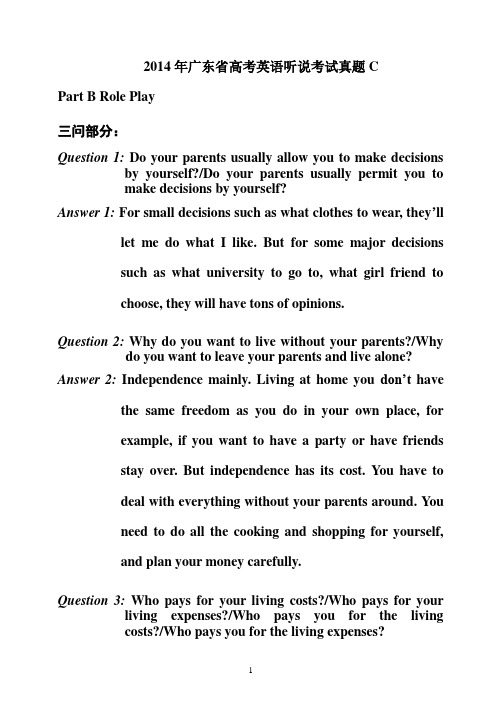
2014年广东省高考英语听说考试真题CPart B Role Play三问部分:Question 1: Do your parents usually allow you to make decisions by yourself?/Do your parents usually permit you tomake decisions by yourself?Answer 1: For small decisions such as what clothes to wear, they’lllet me do what I like. But for some major decisionssuch as what university to go to, what girl friend tochoose, they will have tons of opinions.Question 2: Why do you want to live without your parents?/Why do you want to leave your parents and live alone? Answer 2: Independence mainly. Living at home you don’t havethe same freedom as you do in your own place, forexample, if you want to have a party or have friendsstay over. But independence has its cost. You have todeal with everything without your parents around. Youneed to do all the cooking and shopping for yourself,and plan your money carefully.Question 3:Who pays for your living costs?/Who pays for your living expenses?/Who pays you for the livingcosts?/Who pays you for the living expenses?Answer 3: Well, my parents pay for the tuition and the living costs, but I still need to earn some pocket money. I workSaturday mornings in the local grocery store helpingbehind the counter. That gets me 100 yuan a weekwhich covers my social expenses, such as dinning outwith friends.五答部分:Question 1: What made Tom feel upset?Answer 1: A phone call from his parents./His parents’ phone call.Question 2: How often do Tom’s parents call him?Answer 2: Almost every day.Question 3: Who will probably decide Tom’s choice of university? Answer 3: His parents.Question 4: Where can young people have the freedom to have a party?Answer 4: In their own places./In his own place.Question 5: How does Tom get his pocket money?Answer 5:He works Saturday mornings in the local grocery store./By helping behind the counter in the localgrocery store.Part C Retelling参考复述:Mary wanted to buy a birthday present for her husband Tom, but she wanted to surprise him. So instead of asking him directly, she asked Tom’s sister to phone him and ask him what he wanted for his birthday. Then, she could listen to the conversation from the next room. While they were talking, she heard Tom say he wanted a pair of sneakers. Soon after, Mary went to a shop and bought a pair of nice new sneakers for him. When Tom’s birthday arrived, Mary gave him the present. Tom opened the package, and looked at the shoes, but he didn’t seem very excited. Mary asked him what was wrong. She said she thought he had wanted a pair of sneakers. Tom laughed. He said that actually, he’d wanted a pair of speakers.。
2014年catti三级综合能力口译考试试题及答案解析(二)
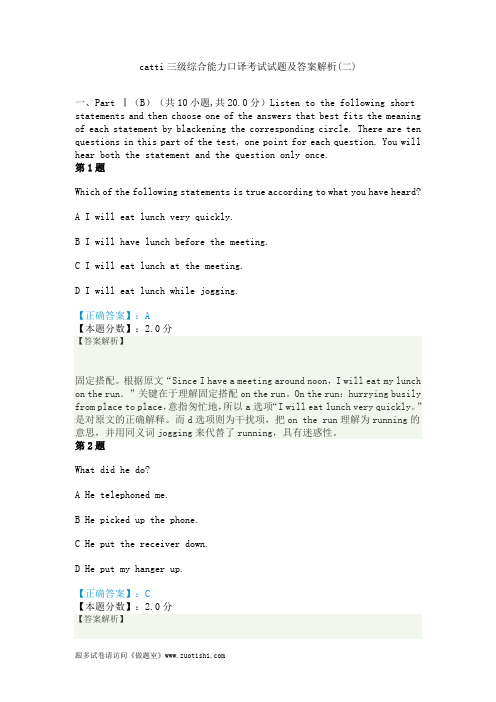
catti三级综合能力口译考试试题及答案解析(二)一、Part Ⅰ(B)(共10小题,共20.0分)Listen to the following short statements and then choose one of the answers that best fits the meaning of each statement by blackening the corresponding circle. There are ten questions in this part of the test, one point for each question. You will hear both the statement and the question only once.第1题Which of the following statements is true according to what you have heard?A I will eat lunch very quickly.B I will have lunch before the meeting.C I will eat lunch at the meeting.D I will eat lunch while jogging.【正确答案】:A【本题分数】:2.0分【答案解析】固定搭配。
根据原文“Since I have a meeting around noon,I will eat my lunch on the run.”关键在于理解固定搭配on the run。
On the run:hurrying busily from place to place,意指匆忙地,所以a选项“I will eat lunch very quickly。
”是对原文的正确解释。
而d选项则为干扰项,把on the run理解为running的意思,并用同义词jogging来代替了running,具有迷惑性。
2014年高考真题英语听力原文附答案(全国卷)
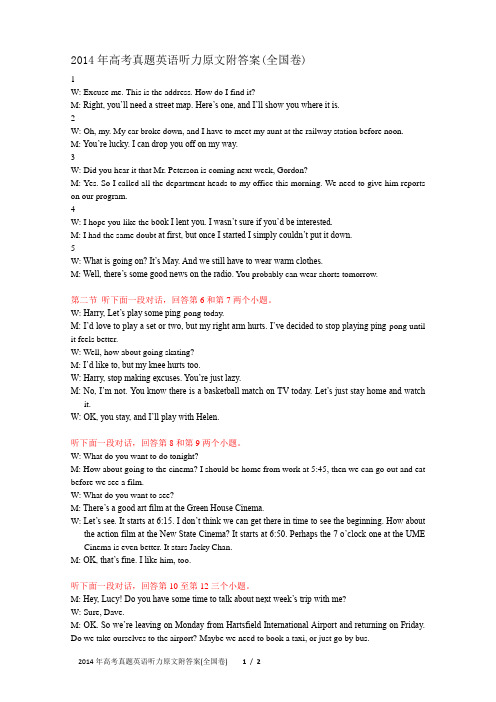
2014年高考真题英语听力原文附答案(全国卷)1W: Excuse me. This is the address. How do I find it?M: Right, you’ll need a street map. Here’s one, and I’ll show you where it is.2W: Oh, my. My car broke down, and I have to meet my aunt at the railway station before noon.M: You’re lucky. I can drop you off on my way.3W: Did you hear it that Mr. Peterson is coming next week, Gordon?M: Yes. So I called all the department heads to my office this morning. We need to give him reports on our program.4W: I hope you like the b ook I lent you. I wasn’t sure if you’d be interested.M: I had the same doubt at first, but once I started I simply couldn’t put it down.5W: What is going on? It’s May. And we still have to wear warm clothes.M: Well, there’s some good news on the radio. You probably can wear shorts tomorrow.第二节听下面一段对话,回答第6和第7两个小题。
上海高级口译英译汉真题2014年3月_真题(含答案与解析)-交互

上海高级口译英译汉真题2014年3月(总分100, 做题时间90分钟)英译汉1.By most reasonable measures, reports of America’s declining power relative to the rest of the world have consistently p roved premature. The American economy increasingly seems to b e on an upswing. The United States remains among the world ’s safest and most attractive investments. The shale gas re volution is transforming the country into an energy giant of the future. The dollar, once slated for oblivion, seems de stined to remain the world’s reserve currency for some time to come. American military power, even amidst current budge t cuts, remains unmatched both in quantity and quality.Meanwhile, the anticipated “rise of the rest,”which other declinists celebrated a few years ago, has failed to mater ialize as expected. For all America’s problems at home –the fiscal crisis, political gridlock, intense partisanship, a nd weak presidential leadership –other great powers, from China to India to Russia to the EU, quite clearly have deb ilitating problems of their own, which in some cases promise to grow more severe in the years to come. Overall, the m uch-heralded return of a multipolar world of roughly equal great powers, as existed before World War II, has been delayed for at least a few more decades. In the absence of some u nexpected dramatic change, for the foreseeable future, the in ternational system will continue to be that of one superpowe r and several great powers, or as the late Samuel P. Hunti ngton once called it, “uni-multipolarity.”SSS_TEXT_QUSTI分值: 100答案:从诸多方面来看,那些将美国经济与世界其他经济体比较后得出美国经济日暮西山的结论,下得有点为时过早。
- 1、下载文档前请自行甄别文档内容的完整性,平台不提供额外的编辑、内容补充、找答案等附加服务。
- 2、"仅部分预览"的文档,不可在线预览部分如存在完整性等问题,可反馈申请退款(可完整预览的文档不适用该条件!)。
- 3、如文档侵犯您的权益,请联系客服反馈,我们会尽快为您处理(人工客服工作时间:9:00-18:30)。
2014年3月高级口译真题:听力部分上半场(原文+解析)第一部分听力(上半场)SECTION 1: LISTENING TEST (30 minutes)Part A: Spot DictationDirections: In this part of the test, you will hear a passage and read the same passage with blanks in it. Fill in each of the blanks with the word or words you have heard on the tape. Write your answer in the corresponding space in your ANSWER BOOKLET. Remember you will hear the passage ONLY ONCE.听力原文:My topic today is how to address the problem of hunger and starvation, which still exists in many parts of the world. To end hunger starts with people's own productivity. A dangerous and patronizing cliche we often hear is: give a man a fish and feed him for a day; teach a man to fish and you feed him for life. People living with chronic hunger have generations of wisdom about'fishing' — the problem is the barbed wire around the lake. The hunger project announced recently by the United Nations cut through the barbed wire, addressing the underlying social conditions that systematically deny hungry people the opportunity they need to end their own hunger. When we invest in a hunger project, we are investing in people's productivity and giving people a chance to translate their hard work into improved well-being. We are ensuring that people get the opportunities which are rightfully theirs. Too often hungry people are isolated, marginalized and exploited. Mobilizing communities and building local organizations is critically important — both to sustain the work we do and to get more out of our precious resources and efforts. When people come together to work, a kind of social capital is created that can compensate for the lack of financial capital in rural areas. In Africa, a unique feature of the hunger project's work is to organize villages to work cooperatively on community land to produce food for food banks. This fosters collective responsibility and action for a better future for all. Another example is in some Asian countries, such as India and Bangladesh, where hunger project volunteer animators have catalyzed the creation of over 1,100 local organizations throughout the country. With nearly 50% ran by women, these local groups create savings programs and invest in individual and collective income generating enterprises, including sowing, tailoring and weaving projects, bakeries and small businesses, fish and poultry farming, bee keeping and plant nurseries. The impact of these enterprises is enormous. As women have become economically empowered, the decision-making roles have increased. As family incomes have often tripled, parents are sending more children —both girls and boys — to school.答案:1.To end hunger2.you feed him for life3.the barbed wire around the leg4.by the United Nations5.systematically deny hungry people6..are investing in people’s productivity7.are rightfully theirs8.marginalized and exploited9.sustain the work we do10. come together to work11. the lack of financial capital12. a unique feature13. on community land14. collective responsibility and action15. some Asian countries16. over 1100 local organizations17. create savings programs18. bakeries and small businesses19. become economically empowered20. family incomes have often tripled解析:本篇以饥饿问题为主题,介绍了由联合国提出的Hunger Project在各国的进展。
所填空格有一定难度,尤其是第3格所填的六个单词“the barbed wire around the leg”,它处在第一段段尾,距离第二段段首的第4格仅隔了五个单词,考生很容易顾此失彼。
但若能在听前纵览全文,较生疏的单词“barbed wire”已经出现在第二段段首,考生能有印象的话,之后听的过程中就不至于猝不及防。
值得欣慰的是,多数长难词的词尾我们在课上进行过大量的练习,比如第6格“investing”中的ing后缀,“productivity”和第14格“responsibility”中的ity后缀,第16格“organization”中的tion后缀。
能在这些长难词上临阵不慌并节省时间,就能从容应付空格中的其它单词。
Part B: Listening ComprehensionDirections: In this part of the test there will be some short talks and conversations. After each one, you will be asked some questions. The talks, conversations and questions will be spoken ONLY ONCE. Now listen carefully and choose the right answer to each question you have heard and write the letter of the answer you have chosen in the corresponding space in your ANSWER BOOKLET.Questions 1 to 5 are based on the following conversation.W: Professor White, I hope I'm not interrupting, but you wanted to see me?M: Oh, hello, Susan. Yes, yes. Come right in. Well, the reason I wanted to talk to you was that while you're presenting your linguistics project in class the other day, I was thinking you're a perfect candidate for the Deans Undergraduate Research Fund.W: Emm... Professor, I am really not sure what that is.M: Undergraduate Research Fundis... It is a mouth for…, I suppose... OK, here is the thing. Every year the school has a pool of money to fund a number of research projects of undergraduate students, because as you can imagine, in-depth research often requires monetary support.W: I would like to expand on my research.M: Good. First, a panel of professors reviews the applicants for the grant, and then they decide which project should be funded. A lot of money could be used for travel expenses to attend a conference for example, or things like supplies, research equipment, resources that are necessary to conduct the research.W: I see.M: Right. And I think you should apply for this grant. Your project is definitely eligible and you can expand it if you haven't necessary resources. So does it sound like something you would be interested in?W: Oh, yeah, sounds great! I thought the topic I work on was very interesting and it is certainly relevant to my linguistics major. I assume it we'll also look good when I try to get into a graduate school, but how do I apply for the grant?M: It is pretty straightforward. A brief description of your proposed project and an estimated budget —how much you need to spend and what you intend to spend it on. Also a glowing letter of recommendation from our linguistics professor wouldn't hurt, which I've been more than happy to write up for you.W: OK, cool! I’m pretty clear on how to carry out my project, but I'm not sure where I can find more information on the subject.M: Well, I've already thought of that. There is this private library at university in Boston. By the way, because I graduated from that school, I can get you access to it, no problem. You see, the library houseslots of unpublished documents that are relevant to your topic.W: So I can put that on the application for the grant that I plan on using material from that library for my research and figure a trip to Boston into my budget?M: Exactly. I really think judging from your work in class and the relevance and clarity of this project, you really have a good chance of getting the funding.W: OK, I'll definitely apply then.M: The sooner, the better. It is due in a few of weeks. And I'll get that letter written up right away.Q1: What is Susan most probably?Q2: What is Susan talking about with Professor White?Q3: Who will decide which project should be funded?Q4: Which of the following cannot be covered by the research fund?Q5: Apart from a brief description of the proposed project and a letter of recommendation, what else is needed for a plan for the grant?解析:第一篇是教授与学生的对话,关于语言学研究项目的拨款申请,具体涉及所需的申请材料,如研究项目的介绍、大致的经费预算、教授的推荐信等等,教授甚至推荐学生去自己在波士顿的母校图书馆搜索所需的资料。
